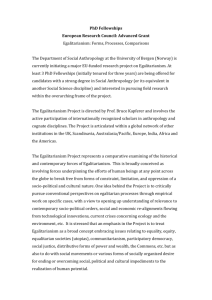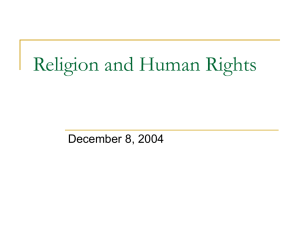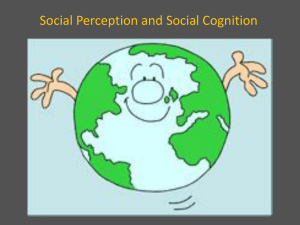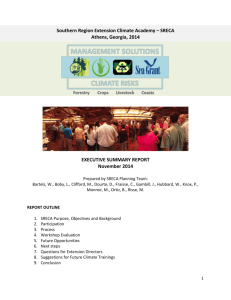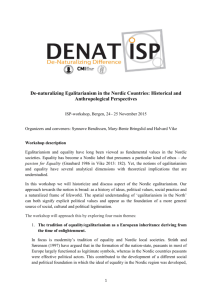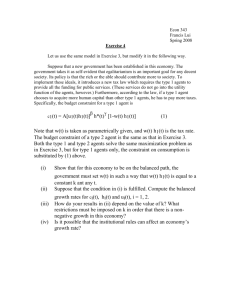Global justice between minimalism and egalitarianism
advertisement
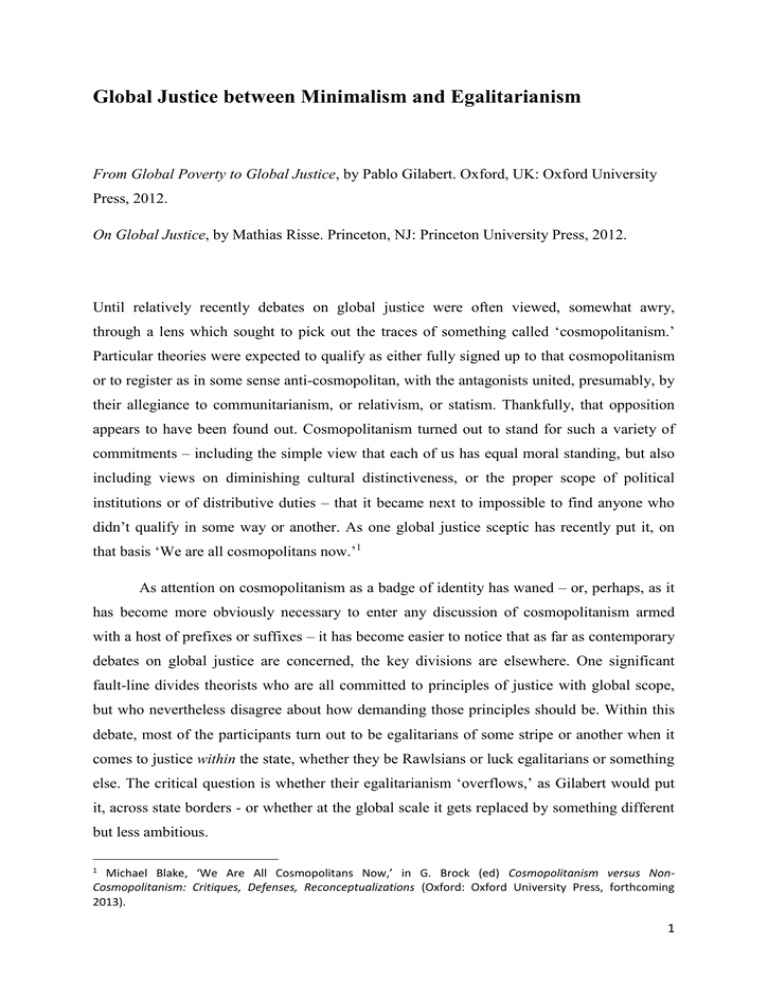
Global Justice between Minimalism and Egalitarianism From Global Poverty to Global Justice, by Pablo Gilabert. Oxford, UK: Oxford University Press, 2012. On Global Justice, by Mathias Risse. Princeton, NJ: Princeton University Press, 2012. Until relatively recently debates on global justice were often viewed, somewhat awry, through a lens which sought to pick out the traces of something called ‘cosmopolitanism.’ Particular theories were expected to qualify as either fully signed up to that cosmopolitanism or to register as in some sense anti-cosmopolitan, with the antagonists united, presumably, by their allegiance to communitarianism, or relativism, or statism. Thankfully, that opposition appears to have been found out. Cosmopolitanism turned out to stand for such a variety of commitments – including the simple view that each of us has equal moral standing, but also including views on diminishing cultural distinctiveness, or the proper scope of political institutions or of distributive duties – that it became next to impossible to find anyone who didn’t qualify in some way or another. As one global justice sceptic has recently put it, on that basis ‘We are all cosmopolitans now.’1 As attention on cosmopolitanism as a badge of identity has waned – or, perhaps, as it has become more obviously necessary to enter any discussion of cosmopolitanism armed with a host of prefixes or suffixes – it has become easier to notice that as far as contemporary debates on global justice are concerned, the key divisions are elsewhere. One significant fault-line divides theorists who are all committed to principles of justice with global scope, but who nevertheless disagree about how demanding those principles should be. Within this debate, most of the participants turn out to be egalitarians of some stripe or another when it comes to justice within the state, whether they be Rawlsians or luck egalitarians or something else. The critical question is whether their egalitarianism ‘overflows,’ as Gilabert would put it, across state borders - or whether at the global scale it gets replaced by something different but less ambitious. 1 Michael Blake, ‘We Are All Cosmopolitans Now,’ in G. Brock (ed) Cosmopolitanism versus NonCosmopolitanism: Critiques, Defenses, Reconceptualizations (Oxford: Oxford University Press, forthcoming 2013). 1 The debate between defenders of global egalitarianism and those committed to what we could call global minimalism is an on-going one.2 Here egalitarians are committed to the view that many contemporary global inequalities are unjust, and that we are able to say this because there are at least some egalitarian principles which have properly global scope. Minimalists, by contrast, insist that we (only) have duties of justice to help outsiders meet their basic human rights, and perhaps to offer them fair terms of international cooperation. Any remaining global inequalities, however much we might want to wish them away, do not constitute evidence of injustice. Minimalists draw on a common stock of reasons in rejecting global egalitarianism as a plausible and coherent alternative, questioning, for instance, whether a ‘metric’ can be provided for it, whether it is feasible, whether it is compatible with national self-determination, with due regard for national responsibility, or with special duties to those close to us. Global egalitarians, for their part, offer robust ripostes to those objections and accuse minimalists of swallowing sour grapes in lowering their normative sights once our gaze moves beyond state borders. And so the debate continues. It is within this on-going debate that the two books under review can be situated. Pablo Gilabert’s book represents a careful and impressively thorough attempt to get us to move our sights – as the title of his book suggests – from the (albeit pressing) eradication of severe global poverty to the amelioration of global inequalities. Mathias Risse’s book, for its part, represents an ambitious and substantial effort to plot a via media between minimalism and egalitarianism at the global level, and to defend a somewhat more patchwork conception of global justice according to which some principles of justice extend to the global level but others do not. Risse’s book attempts to persuade us that the ground between global egalitarianism and global minimalism is a secure and indeed attractive territory in which to locate ourselves. Gilabert’s book attempts to persuade us that it is deeply insecure ground, on which we are constantly under threat of being forced on to the (morally) higher ground of global egalitarianism. Gilabert’s book is also concerned, to be sure, to tell us that the fight against global poverty is important, coherent and feasible. The first part of his book is devoted precisely to defending the idea of (positive and negative) duties to tackle global poverty from a variety of critics (including libertarians). But whilst it makes sense to prioritise the fight against poverty, that fight does not exhaust the concerns of global justice. The second part of the 2 For a fuller discussion, see Chris Armstrong, Global Distributive Justice (Cambridge: Cambridge University Press, 2012). 2 book seeks to rehabilitate global egalitarianism in light of the series of objections mentioned earlier. As a catalogue of these objections and of the best available responses to them, the discussion is state-of-the-art. It will be a very valuable resource for anyone interested in the debate raging about the prospects and pitfalls of broadening the egalitarian (and, Gilabert hints at a number of points, socialist) project beyond the borders of individual nation-states. Whilst the book does not attempt to offer its own theory of global justice in the way that Risse’s does, and whilst it broadly aims at defending global egalitarianism as a whole rather than one particular conception of it, it does provide a very good map of the territory fought over by minimalists and egalitarians as well as some invaluable pointers about how egalitarians might be able to capture the field. The focus on the issue of feasibility is a core feature of the book, and a real strength. It is often said – by many students on courses on global justice, for instance – that greater global equality sounds all very well, but that we cannot sanely expect it to happen ‘in the real world.’ Gilabert does not attempt to tell us in any detail just how greater global equality might transpire, but he does cut the objection down to size. He usefully distinguishes between concerns about the accessibility and the likely stability of a more just world, and suggests that it is the former which represents the real challenge (p. 240). But even if there are serious questions about whether we should expect greater global equality to materialise, that does not disqualify it as a goal. To be more specific, it might be that we should avoid formulating principles which could truly never be implemented (because they are, for instance, logically impossible). But this is not true as often as is sometimes supposed, given that many apparent constraints on what is achievable turn out to be rather more ‘soft’ and flexible than we might suppose. Furthermore, even if a theory of justice failed to identify anything that agents can do now to bring it closer to fruition, that still would not disqualify it as a critical standard. Such critical standards are both possible and necessary. (That view leads Gilabert, for instance, to reject especially austere views on what can be described as a human right; p. 114). To be sure, this position does make what we can say about justice somewhat complicated. For instance, a particular standard of justice may be wholly inaccessible right now, in the sense that there is nothing that agents can do to bring a more just world any closer. As a result they cannot, on Gilabert’s account, have duties of justice to improve the situation that they find themselves in. When this impasse exists we can still say that a situation is less just than other conceivable situations, but because no agents have acted unjustly in failing to bring about a better world, we can also say that it contains no injustice 3 (pp. 115-6). We use the language of ‘more or less just’ to describe how close we are to an ideal distribution, and the language of ‘justice and injustice’ to describe whether agents are doing what they can reasonably be expected to do to move us closer to that ideal distribution. The thought that the world around us, with all of its staggering inequalities, might be much less just than it ought to be but at the same time contain no injustice is an odd one, and we might think that if they believed it egalitarians would have accepted the more austere prognosis offered by minimalists after all. But actually that description does not apply, because in our world there are things we could do to bring about greater equality, and if we have so far failed to effect these changes we can say that we are acting unjustly. It is true that the kinds of institutional structures that would coordinate our activities and allow us to make major inroads against global inequalities simply do not exist. But we are nevertheless obliged, by justice, to do what we can to bring those institutions into existence. We have, as Gilabert puts it, ‘dynamic duties’ to act on the world so as to improve its capacity to deliver on greater equality. And once that capacity exists, duties of justice demanding that we reduce inequalities can then come into existence (pp. 137-8). A fuller discussion of the nature of those duties – and of just whom they fall upon, and why – would have been fascinating. Do such duties fall on all of us, or (mainly?) on those particularly well-placed to bring about institutional change? Many of us (especially those of us who live in democracies) can do something to bring about the kind of change that would make our world more amenable to global justice. But some of us might be especially well-placed to do so (think of political leaders, public intellectuals, perhaps even academics). Do those people bear a greater share of any dynamic duties? Or do they simply stand more chance of performing them? If the former, are we asking too much of those with the capacity to bring about change? If Gilabert believes that progress will demand the emergence of a stronger ethic of global solidarity (pp. 100-1), what are its most likely sources? Will it arise, as one provocative recent account has it, within states?3 Those questions certainly provide fertile ground for further study. A substantial chapter in the second part of the book seeks to pull together and rebut the major challenges to global egalitarianism. Gilabert sets out those objections, and the most promising responses to them, with admirable clarity and precision. But some of the responses are more conclusive than others. Within the discussion of the ‘metric’ objection to global 3 Lea Ypi, Global Justice and Avant-Garde Political Agency (Oxford: Oxford University Press, 2012). 4 egalitarianism, for instance, he makes the intriguing (but very brief) suggestion that allowing people to migrate to more ‘successful’ communities offers a way of answering the metric objection – and indeed that it actually represents a metric itself (p. 216). There is a lively debate about whether greater migration would be a good or a rather poor mechanism for tackling global inequalities, but that is not my main concern here. What is intriguing – but far from clear – is whether equal opportunities to move to more successful countries could be a metric for equality in the first place. I’m not sure that it can be, since it appears to depend itself on a prior metric for measuring which countries are ‘successful’ or not, and to what extent, which would presumably itself need to be answered by reference to their tendency to secure welfare, or resources, or capabilities for their inhabitants. If that is right, then equal opportunities to migrate is not itself an independent metric, but a method for equalizing opportunities along some pre-existing metric. Consider, also, the objection from national self-determination. Here, the claim is roughly that belonging to a self-determining community is something that we all have an interest in, and that ethical universalists therefore have reason to take its demands seriously. But if we believe that separate institutions have the right to make separate decisions about some range of distributive issues, won’t the results inevitably thwart global equality? If so, how should the global egalitarian accommodate that? By denying the right to selfdetermination? By claiming that it is in fact compatible with globally-egalitarian distributions? Or by accepting that some trade-offs need to be made between the values of self-determination and distributive egalitarianism? Gilabert pursues the second response to some degree, noting that global egalitarianism demands equality across some key measures but not all (p. 212), leaving some space for local variation. But the position on trade-offs is rather inconclusive. He suggests that there will be cases in which we need to trade off the two values, and that all that egalitarians demand in such cases is that ‘global egalitarianism remains an active consideration’ in any such trade-offs (p. 211). But surely we will then want to know how to trade off the two values, whether global egalitarianism will win sometimes, or usually, or almost always, or never; suggesting that global egalitarianism remains in play is going to be no consolation if it turns out to lose out in the trade-off in most or all cases. Gilabert suggests that in general a concern with global egalitarianism can only be expected to generate pro tanto judgements in the direction of greater equality, which obviously could be defeated in trade-offs, or by considerations of transition costs (p. 219). On the one hand that sounds right, but on the other hand it means we have little indication of how transformative a 5 project he believes global egalitarianism is likely to be, all-things-considered. These questions, though, do not detract from the many contributions which Gilabert’s book does make. They merely suggest that a knock-out blow against global egalitarianism’s critics has not yet been landed. In On Global Justice, Mathias Risse defends an account of justice which he calls pluralist internationalism. The account rejects both exclusively globalist accounts of justice (which maintain that any good principles of justice must by definition be global principles) and exclusively statist accounts (which suggest that the demands of justice apply uniquely within states). Risse instead wants to defend an account which is simultaneously globalist and statist in its different elements, and therein lies the pluralism. Thoroughgoing statists are right that there is something normatively distinctive about the state, such that special (and specifically egalitarian) principles are appropriate between co-citizens. But that is not the whole story. Globalists are right that there are a number of constraints of distributive justice on what might be permissible at the global level. Not all of the demands of justice cease at the border, but some of them do, and some of them might even begin there. As I suggested earlier, then, justice here begins to look less like either global minimalism or global egalitarianism, and more of a complex patchwork. Of course many theorists have begun to argue that there must be conceptual space between statism and globalism (and indeed that bodies such as the European Union might trigger discrete demands of justice).4 Likewise, even those who confine egalitarianism to the state sometimes insist that we have duties of justice to help others secure their basic human rights: the two sets of principles presumably have separate grounds. Risse’s account is unusual, though, in offering such a variety of separate grounds for different principles of justice and in working through their distinct implications. Five such grounds, in fact, can be worked up to provide guidance on a whole range of issues, ranging from domestic distributions to the regulation of trade, natural resource appropriation, and an account of human rights. It is in following through their (sometimes overlapping) logic that we begin to understand better what the demands of global justice truly are (pp. 1-20). The work’s most important contribution probably lies with its efforts to rehabilitate the idea of common ownership of the earth as an independent grounding for principles of 4 See e.g. Andrea Sangiovanni, ‘Solidarity in the European Union,’ Oxford Journal of Legal Studies (forthcoming 2013). 6 justice, and the central chapters on natural resources represent a very valuable attempt to stimulate discussion specifically on the issues that their distribution throws up. Common ownership is an idea which, as Risse notes, has passed from canonical status within the political theory of the seventeenth century to relative obscurity now (p. 89). But if we take seriously the idea that no-one has any unequal prior entitlement to the inhabitable spaces and usable natural resources of our world – since no-one, barring exceptional cases, put them there – then surely that must constrain any tolerable holdings in some way. In light of our common ownership of the world how could we justify, for instance, a situation in which some are deprived of the basic resources required for food, clothing or shelter? Here Grotius is a particular inspiration, with Risse adopting a secularised version of common ownership as a constraint on permissible distributions. This ground does not depend for its force on the existence of global institutions, or on the rich of the world actually exploiting the poor. It is enough to be able to say that we live in a world which is bountiful enough for none of us to starve. The implications of pluralist internationalism are then carefully, incrementally elucidated across the many chapters of the book. The book is hugely ambitious and indeed demanding. Despite its theoretical novelty, though, and notwithstanding Risse’s patient efforts to differentiate his views from those of many rival theorists, it eventually becomes apparent that that the sum total does not represent a radical departure from a broadly ‘minimalist’ account of global justice. Given Risse’s suggestion that Rawls, along with Grotius, is the great interlocutor of the book, it is worth investigating the similarities with the position staked out in The Law of Peoples a couple of decades ago in particular. The two accounts turn out to overlap at many points. Whereas domestically citizens owe to one another something like Rawls’s two principles of justice, for Risse egalitarian principles are not required to secure justice at the global level (p. 10). Instead we owe other societies a ‘duty of assistance’ in developing decent institutions that will allow them to meet the basic needs of their own citizens (p. 80). Justice is therefore compatible with large international inequalities in, for instance, natural resource holdings. These should not concern us, at the level of justice, because there is scant evidence that these inequalities significantly determine the overall success or failure of societies, as opposed to ‘internal’ institutional factors for instance (pp. 65-8, p. 127). In any case we could not defend an egalitarian account of natural resource justice, for example, because we could not produce a metric for resource equality which would be acceptable to people in different communities, given the divergent ways in 7 which they employ and value resources (pp. 122-3). Our sights should be set on the constraints that different communities could converge on. Institutionally, rather than global justice being pursued via a world state we should assume that the world of states is going to be a reasonably permanent fixture, though the autonomy of states is to be constrained by something like the 1948 list of human rights (including subsistence rights but, notably, excluding any human right to democracy). All of that would be happily signed up to by a defender of The Law of Peoples. Does the account make progress, though, in rectifying some of the omissions that plague Rawls’s account? Rawls, for instance, fails to help us theorise how to spread the burdens of mitigating climate change, and assumes without much in the way of argument that states should exercise great control over their borders and ‘their’ natural resources. Does Risse’s account do better? It certainly does. But one of the most intriguing features of the discussion is that as far as justice goes its demands are often surprisingly modest. Take the issue of climate change. Here, justice appears (only) to demand that no-one appropriates so much of the absorptive capacity of the world’s carbon sinks that others are then unable to secure their basic needs. There would not appear to be any objection, at the bar of justice, to a situation whereby richer states consumed vastly unequal shares of the carbon-sequestering functions of global carbon sinks, removing poorer states’ ability to ‘catch up’ economically. Neither is there anything remiss, from the point of view of justice, if one political community monopolises the most valuable resources of the world in general, leaving all others with shares barely able to secure their basic needs. To a global egalitarian this is going to be an alarming conclusion. But it is not the end of the story for Risse. Accompanying his account of justice is an intriguing account of the ‘demands of reasonable conduct.’ Often we act in ways that, whilst not unjust, infringe standards of what can reasonably be accepted by those affected by those actions (p. 132). Justice, after all, is not the whole or morality. Consider again the example of natural resource shares. A massive inequality in holdings would not, for Risse, be unjust, but might be unreasonable in the sense that others could not reasonably be expected to accept it. Risse suggests it would not therefore be unjust if outsiders sought to enter a richer territory – illegally, if it came to it – in order to share in its excessive resource wealth. But whilst it would not be unjust for outsiders to seek to enter and share in this wealth, neither would it be unjust for inhabitants of our rich country to prevent them from entering, forcibly if necessary. Justice, here, has little to say – and we certainly do not find proposals for global resources 8 taxes or anything of that ilk. Standards of reasonable conduct do still apply though and suggest that incursions on the territory of the rich are justifiable for as long as the rich refuse to share their wealth, or cede some territory. This position is unusual and thought-provoking. But it is also – surprisingly, in the midst of such a carefully-argued and circumspect account – underdeveloped. The division of labour between justice and reasonableness looks to be tremendously important both conceptually and in terms of the payoff for global justice. Demands of reasonable conduct, rather than demands of justice, turn out to dictate a principle of intergenerational equality, and also suggest a solution to the problem of how to allocate the costs of mitigating and adapting to climate change. It would not have been odd at all, in light of this division of labour, if Risse had chosen to call his book On Global Justice and Reasonable Conduct, given that many of its most interesting and demanding conclusions actually derive not from the standards of the former, but from the latter. But what we can say about those potential conclusions must remain very tentative, because this half of the argument raises but does not settle at least three major puzzles: First, just what does it mean to say that something is unreasonable but not unjust? All we know for sure is that the standards in question are moral standards but not standards of justice (p. 132), and that at any duties arising from them will be less stringent than duties of justice (p. 6). Risse freely admits that he does not offer grounds for theorising the nature and demandingness of these moral standards (p. 132). But given that fact, the reader is not armed with clear standards for assessing whether Risse’s precise claims about what they demand are correct; we may have to take that on faith. How, furthermore, are the demands of reasonable conduct to be weighed against duties of justice, when the two compete? If a given community violates global standards of reasonable conduct but claims that it has done so in the interests of domestic justice, what then? Or can such conflicts never occur? Second, how should unreasonable but not unjust distributions be redressed? In the immigration case we are told that a definite and striking response can be made by the disadvantaged: they can up sticks and move to our richer state. This is far from an ideal conclusion, obviously. Doing so will be costly, disruptive, and perhaps dangerous, given that Risse thinks the potential receiving state can use reasonable force to repel them without acting unjustly (p. 125, p. 153). But at least it is something. States might want to redistribute resources to avoid such a possibility (if, for instance, that proved cheaper than manning the 9 borders). But consider the contemporaneous example of climate justice. Here the salient features of the benefits offered by global carbon sinks is that they are non-excludable and subtractive. Currently industrialised countries are able to blithely over-consume their absorptive capacity, and thereby immediately reduce the opportunities of others. This overconsumption is not unjust, for Risse, if it allows people (now and in the future) to meet their basic needs. But it may well mean that subsequently-industrialising countries are trapped into relative poverty, lest their own development produces a climate catastrophe. Such overconsumption clearly oversteps standards of reasonable conduct, though. So what can those who are thereby disadvantaged justifiably do? Can they seize the assets of currently industrialised countries? Or is there an argument for compensation? If so, how would we calibrate it? Is there anything else the disadvantaged might permissibly do? In the face of absolute deprivation of natural resources Risse invokes a ‘right of necessity’ (99), but what of so-called ‘rights of resistance’? Is resistance permissible in cases of unreasonable inequalities? The argument that those excluded from a basic share of resources can justly attempt to cross borders might be one exercise of such a right, but aside from crossing borders, what forms might such resistance take? Would the range of permissible responses extend beyond illegal immigration and into sabotage, theft of misbegotten goods, violations of intellectual copyright, and so on?5 Third, it remains mysterious how we are able to affirm globally egalitarian standards of reasonable conduct, when such standards are explicitly disqualified as standards of justice. In his discussion of competing visions of ownership of the earth, for instance, Risse rules out the idea of equal division of the earth’s resources and spaces. Such a notion cannot really get off the ground, because the value of resources and spaces depends on conventions about how they can be used, or levels of technological advancement, and these differ between societies. We cannot operationalize global principles of justice which are fully egalitarian in light of such metric problems, because there is simply no single most plausible way of understanding the value of resources which everybody could reasonably accept (pp. 122-3). Nevertheless Risse’s arguments about standards of reasonable conduct are, as the observant reader will already have noticed, often egalitarian in implication. This raises the obvious question: if we can develop intelligible global egalitarian constraints on reasonable conduct, why can’t those standards then underpin principles of justice? (Indeed Risse judges over- or under-use of land 5 For a discussion of rights of necessity and rights of resistance – and some of the forms they might take – see Simon Caney, ‘In the Absence of Global Justice and Global Democracy: Rehabilitating the Right of Necessity,’ ms. 10 and resources by employing a benchmark familiar to many defenders of equal shares of natural resources within the global justice literature: world market prices (pp. 155-6)).6 But if local valuations rule out cross-communal principles of justice, why do they not also undermine global standards of reasonable conduct? Risse acknowledges the tension here, but suggest that there is a difference between an egalitarian standard of justice and a similar standard of reasonable conduct. To use a universal standard for the latter is a ‘political’ and pragmatic move, but using the same standard to define a principle of justice would be illegitimate (p. 159). I confess that, having read the brief argument to this effect several times, I am not sure where exactly the difference is supposed to lie. Is the thought that principles of justice are potentially going to be backed by law, and that therefore it is vital, given their seriousness, that there is already widespread agreement about what resources are worth and how they should be used? That surely cannot be the thought, because if that is what Risse thinks it is hard to see how he can be a domestic egalitarian. Disagreement about how we should value and use resources is, after all, widespread within many societies, as Gilabert (p. 212) notes). The fact that the state has the power to impose one set of rules does not mean they are uncontroversial. This issue is important, since the principal basis on which Risse resists global egalitarianism with regards to natural resources is precisely this one – the claim that there is no available metric for such a conception. As a result the project of defending a via media between minimalism and egalitarianism rather depends on whether argument against egalitarianism, at least with regards to natural resources, can be completed or not. The two books, then, aptly illustrate the on-going debate between egalitarians and minimalists about exactly how demanding any principles of global justice ought to be. If Gilabert is right, many global inequalities are not only morally objectionable but unjust, with the implication that we should attempt to rectify them with the means currently at our disposal, and indeed work to enhance our capacity to reduce such gulfs across a number of important dimensions. Risse’s view is much more modest on this score, in the sense that whilst some inequalities can sometimes matter, in general the demands of global justice – as opposed to less stringent moral standards – tend to fall short of condemning many of the inequalities which Gilabert would single out for rebuke. Given his book’s considerable scope and complexity, it would have been impossible, in the space which has been available here, to 6 See e.g. Hillel Steiner, ‘Territorial Justice and Global Redistribution,’ in G. Brock and H. Brighouse (eds) The Political Philosophy of Cosmopolitanism (Cambridge: Cambridge University Press, 2005), pp. 28-38. 11 really scrutinise Risse’s grounds for rejecting global egalitarianism across the board. In the area I have focused on – rights over natural resources – the argument against global egalitarianism appears incomplete. For his part, Gilabert gives ample grounds for confidence that the struggle to vindicate egalitarianism as a compelling and meaningful position within debates on global justice can be a successful one – but he also reminds us that work remains to be done. 12
